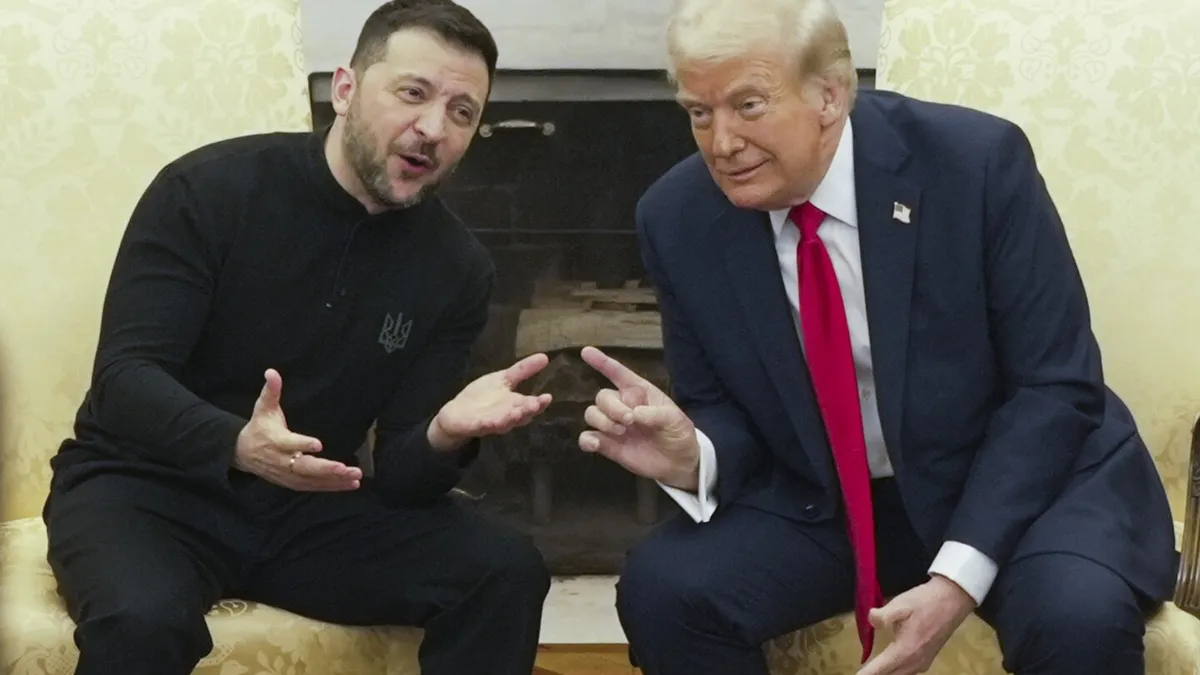
In a significant development, Ukraine is set to sign a groundbreaking mineral resources agreement with the United States in Washington on Wednesday. This information comes from two senior Ukrainian officials who requested anonymity as they were not authorized to publicly discuss the matter. Currently, Ukraine's Economy Minister, Yulia Svyrydenko, is in Washington finalizing the technical details of the agreement.
The urgency of this agreement is underscored by the fact that it aligns with the Trump administration's push for securing rare earth elements from Ukraine. President Trump has indicated that access to these resources is a condition for providing further support to Ukraine amid its ongoing conflict with Russia, which has now persisted for over three years. Ukraine is rich in essential minerals including titanium, utilized in aerospace manufacturing, and lithium, crucial for modern battery technologies. Additionally, Ukraine holds deposits of uranium, which are vital for nuclear power and medical applications, alongside graphite and manganese, both integral to electric vehicle batteries.
Negotiations surrounding this agreement had faced delays earlier this year, particularly following a tense meeting in the Oval Office between U.S. and Ukrainian leaders in February. For Ukraine, this deal is viewed as pivotal for securing future military aid from the United States. Before the Washington meeting, the Ukrainian Cabinet is expected to approve the agreement's text, which will subsequently require ratification by the Ukrainian parliament to take effect.
According to one of the Ukrainian officials involved in the discussions, the agreement comprises multiple documents, including a principal agreement and at least two technical accords that outline the structure and operations of a joint fund. The official also expressed satisfaction with the evolution of the agreement following ongoing negotiations, while another official voiced hope for no further modifications from the U.S. side. Ukraine has introduced new provisions to the agreement to address earlier concerns that the initial U.S. draft, presented in March, favored American interests disproportionately.
As this agreement unfolds, the broader context of the Russia-Ukraine conflict remains complex. A senior Kremlin official remarked that finalizing a deal to end the war is “far too complex to be done quickly.” This statement reflects the ongoing frustrations in Washington as it attempts to broker a peace agreement while dealing with the slow progress of talks.
Recently, a nighttime Russian drone attack on Kharkiv, Ukraine’s second-largest city, resulted in injuries to at least 45 civilians, highlighting the human cost of the conflict. The United Nations has reported a surge in civilian casualties in Ukraine during the past weeks, coinciding with Washington's intensified efforts to mediate peace.
Russian President Vladimir Putin has expressed a willingness to consider a ceasefire prior to negotiations but emphasizes the need to clarify several issues first. Kremlin spokesperson Dmitry Peskov reiterated that while quick progress is desired, the complexities of resolving the Ukrainian crisis cannot be overlooked. Peskov stated, “There are many details and an array of small nuances that need to be solved before a settlement.”
U.S. President Trump has previously voiced his dissatisfaction with the slow pace of negotiations, claiming he could resolve the conflict within 24 hours if re-elected. Meanwhile, Western European leaders have accused Putin of stalling negotiations to gain more territory in Ukraine, which has seen nearly a fifth of its land captured since the onset of Russia's full-scale invasion on February 24, 2022.
In an effort to expedite the peace process, the U.S. State Department has urged both Ukraine and Russia to present concrete proposals for ending the conflict. Spokeswoman Tammy Bruce quoted U.S. Secretary of State Marco Rubio, stating, “We are now at a time where concrete proposals need to be delivered by the two parties on how to end this conflict.” She cautioned that without progress, the U.S. may need to withdraw from its mediating role.
Russia has effectively rejected a U.S. proposal for an immediate 30-day ceasefire, linking it to a halt in Ukraine's mobilization and Western arms supplies. Russian Foreign Minister Sergey Lavrov claimed that Ukraine's call for an unconditional truce is a response to being pushed back on the battlefield.
Amid these developments, the United Nations reported an alarming increase in civilian casualties in Ukraine. In the first three months of this year alone, there have been 2,641 verified civilian casualties, which is significantly higher than the same period last year. The Ukrainian air force reported that Russia launched over 100 drones at Ukrainian cities recently, further exacerbating the humanitarian situation.
In conclusion, the impending signing of the mineral resources agreement between Ukraine and the United States signifies a crucial step in strengthening U.S.-Ukraine relations, especially in the context of ongoing military support and resource management. However, the complexities surrounding peace negotiations continue to pose significant challenges as both sides grapple with the realities of the conflict.